Introduction: Puppy Dental Care
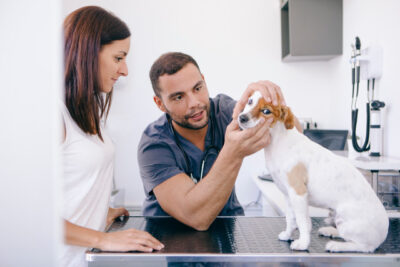
Welcoming a new puppy into your home is an exciting time, but it also comes with the responsibility of ensuring their health and well-being, including their dental care. Just like humans, puppies require proper dental care to maintain good oral hygiene and prevent dental issues later in life.
In this comprehensive guide, we’ll explore everything you need to know about taking care of your puppy’s teeth, from understanding their dental development to establishing a dental care routine and addressing common dental problems. By following these tips, you can help your puppy maintain a healthy and happy smile for years to come.
Importance of Puppy Dental Care
Dental care is crucial for puppies to maintain their overall health and well-being. Just like humans, puppies can suffer from dental issues such as tartar buildup, gum disease, and tooth decay if their teeth are not properly cared for. Regular brushing and dental check-ups can help prevent these problems and ensure that your puppy’s teeth remain healthy and strong. Good dental hygiene can also prevent bad breath and discomfort for your furry friend, allowing them to enjoy their meals and playtime to the fullest. Start dental care early to establish good habits and set your puppy up for a lifetime of healthy smiles.
Common Dental Issues in Puppies
Common dental issues in puppies include tartar buildup, which can lead to gum disease and tooth decay if not addressed. Puppies may also experience retained baby teeth, which can cause overcrowding and misalignment of adult teeth. Additionally, puppies may suffer from fractured or broken teeth, often caused by chewing on hard objects.
It’s important to monitor your puppy’s dental health and seek veterinary care if you notice any signs of dental issues, such as bad breath, drooling, or reluctance to eat. Regular dental check-ups and proper dental care can help prevent these issues and ensure your puppy’s teeth stay healthy.
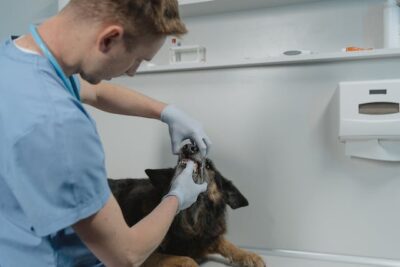
Understanding Your Puppy’s Teeth
Stages of Puppy Teeth Development
Understanding your puppy’s teeth is crucial for their overall health and well-being. Like human babies, puppies go through different stages of teeth development. They are born without teeth, but around three weeks, their baby teeth, or deciduous teeth, start to come in. These teeth are sharp and help them explore their world through chewing.
At around four months, these baby teeth start to fall out, making way for their adult teeth. It’s important to provide your puppy with appropriate chew toys during this teething stage to alleviate discomfort and prevent them from chewing on inappropriate items. Regular dental care from a young age can help ensure your puppy’s teeth remain healthy throughout their life.
Differences between Puppy Teeth and Adult Dog Teeth
Understanding the differences between puppy teeth and adult dog teeth is essential for proper dental care. Puppies have 28 baby teeth, also known as deciduous teeth, while adult dogs have 42 permanent teeth. Puppy teeth are smaller, sharper, and whiter compared to the larger, duller, and slightly yellow adult teeth.
Another key difference is that puppy teeth are temporary and start falling out around four months of age, gradually replaced by adult teeth. Proper dental hygiene, including regular brushing and veterinary check-ups, is crucial to maintain your dog’s oral health during both stages of teeth development.
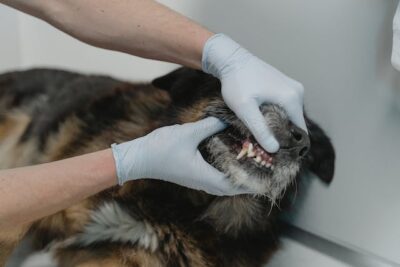
Signs of Dental Problems in Puppies
Bad Breath
Bad breath, or halitosis, can signal dental issues in puppies, often stemming from bacteria buildup leading to plaque and tartar. Persistent bad breath may indicate gum disease, tooth decay, or other oral problems requiring veterinary care.
Regular dental check-ups and proper oral hygiene, including teeth brushing, can help prevent issues and keep your puppy’s breath fresh.
Discolored Teeth
Discolored teeth in puppies could point to dental problems like decay, enamel defects, or trauma. Healthy puppy teeth should be white or slightly off-white. Discoloration, seen as yellow, brown, or grey spots, may indicate problems needing veterinary attention.
Regular dental check-ups and good oral hygiene, including teeth brushing, can help prevent issues and maintain oral health.
Excessive Drooling
Excessive drooling in puppies can indicate dental problems such as gum disease, tooth decay, or mouth infections. While some drooling is normal, especially in certain breeds, persistent or sudden increases may suggest an underlying problem. Watch for other signs like bad breath, reluctance to eat, or pawing at the mouth.
Regular dental check-ups and proper oral hygiene, including brushing your puppy’s teeth, can help prevent dental problems and maintain their oral health.
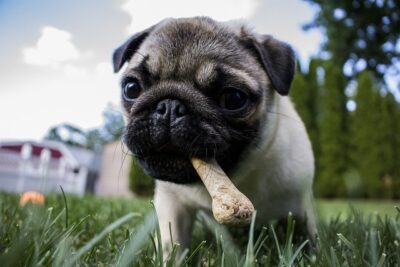
Establishing a Puppy Dental Care Routine
Daily Brushing Techniques
Establishing a dental care routine for your puppy is crucial for their oral health. Daily brushing is one of the most effective ways to maintain their teeth and gums. Use a soft-bristled toothbrush and dog-friendly toothpaste to gently clean their teeth in circular motions.
Start slowly, allowing your puppy to get used to the process, and gradually increase the duration as they become more comfortable. Regular brushing can help prevent dental problems and keep your puppy’s mouth healthy.
Choosing the Right Toothbrush and Toothpaste for Your Puppy
Establishing a dental care routine for your puppy begins with selecting the right toothbrush and toothpaste. Look for a toothbrush with soft bristles and a small head, specifically designed for puppies. Avoid using human toothpaste, as it can be harmful to dogs.
Instead, choose a toothpaste formulated for dogs, with flavors like poultry or beef to make brushing more enjoyable for your puppy. A proper toothbrush and toothpaste can make dental care a positive experience for your puppy and help maintain their oral health.
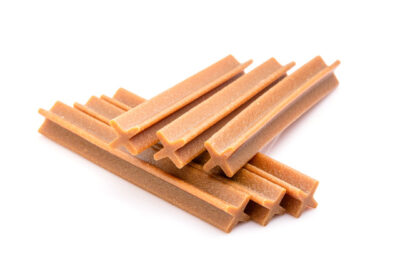
Other Dental Care Products (e.g., Dental Chews, Mouthwash)
In addition to brushing, other dental care products can help maintain your puppy’s oral health. Dental chews are a great way to supplement your puppy’s dental care routine, as they help reduce plaque and tartar buildup.
Dog-friendly mouthwash can also be used to freshen your puppy’s breath and promote overall oral hygiene. Incorporating these products into your puppy’s dental care routine can contribute to their long-term dental health.
Preventative Puppy Dental Care Measures
Proper Diet for Dental Health
Proper diet plays a crucial role in your puppy’s dental health. A balanced diet that includes high-quality puppy food helps maintain strong teeth and gums. Dry kibble is especially beneficial as it can help clean teeth by reducing plaque and tartar buildup. Avoid feeding your puppy table scraps or sugary treats, as these can contribute to dental issues.
Additionally, providing dental chews or toys designed to promote dental health can help keep your puppy’s teeth clean and healthy. Regular veterinary check-ups and dental cleanings are also essential components of preventative dental care for your puppy.
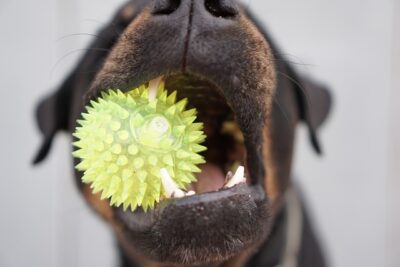
Importance of Chew Toys
Chew toys are important for your puppy’s dental health as they help to clean teeth, massage gums, and reduce plaque and tartar buildup. They also provide mental stimulation and help alleviate teething discomfort.
Choose chew toys that are appropriate for your puppy’s age, size, and chewing habits to prevent choking hazards or tooth damage. Regularly inspect the chew toys for wear and replace them when necessary to ensure your puppy’s dental health is supported.
Avoiding Dental Hazards (e.g., Hard Bones, Toys with Small Parts)
Preventing dental hazards is crucial for your puppy’s oral health. Avoid giving your puppy hard bones or toys with small parts that could break or splinter, potentially causing dental injuries or choking hazards. Instead, opt for soft, chewable toys that are safe for your puppy’s teeth and gums. Supervise your puppy during playtime to ensure they are not chewing on hazardous objects.
Regular veterinary check-ups and dental cleanings are also important for maintaining your puppy’s dental health.
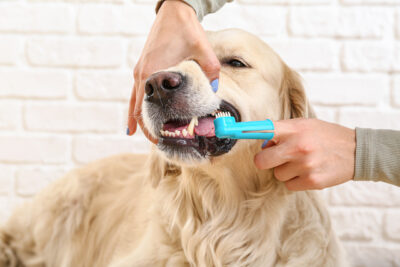
Training Your Puppy for Dental Care
Positive Reinforcement Techniques
Training your puppy for dental care using positive reinforcement techniques can make the process enjoyable for both of you. Start by introducing your puppy to the toothbrush or dental chew gradually, allowing them to sniff and investigate it. Use treats and praise to reward your puppy for allowing you to handle their mouth and teeth.
Slowly work up to brushing or using dental chews, always praising and rewarding good behavior. Consistent, positive reinforcement will help your puppy associate dental care with positive experiences, making it easier to maintain their oral health in the long run.
Introducing Your Puppy to Toothbrushing
Introducing your puppy to toothbrushing can be a gradual process. Start by getting your puppy used to having their mouth touched. Gently lift their lips and touch their teeth and gums with your finger. Once they are comfortable with this, introduce a toothbrush specifically designed for dogs. Use a small amount of dog-friendly toothpaste and gently brush their teeth in a circular motion.
Reward your puppy with praise and treats to make the experience positive. Gradually increase the duration of the brushing sessions as your puppy becomes more accustomed to the routine.
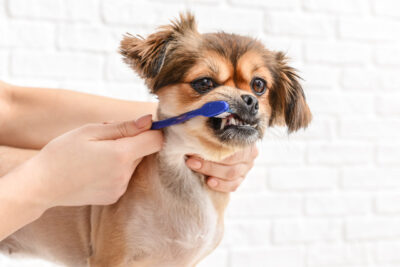
Breed-Specific Puppy Dental Care Considerations
Puppy Dental Care for Small Breed Puppies
Dental care for small breed puppies requires special attention due to their small mouths and teeth. Small breeds are more prone to dental issues, so it’s important to start a dental care routine early. Use a small, soft toothbrush and dog-friendly toothpaste to gently brush their teeth.
Provide dental chews or toys designed for small breeds to help clean their teeth and massage their gums. Regular veterinary check-ups are essential to monitor their dental health and address any issues early.
Puppy Dental Care for Large Breed Puppies
Dental care for large breed puppies is important to prevent dental issues as they grow. Large breeds are prone to dental problems due to their size and jaw structure. Use a larger toothbrush and dog-friendly toothpaste to gently brush their teeth, focusing on the back molars where plaque tends to accumulate.
Provide dental chews or toys that are appropriate for large breeds to help clean their teeth and prevent tartar buildup. Regular veterinary check-ups are crucial to monitor their dental health and address any issues early.
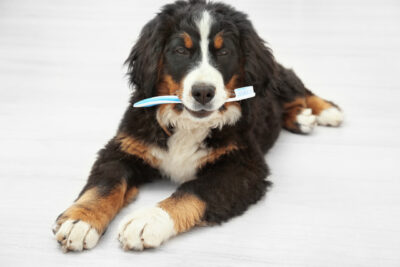
Addressing Specific Dental Issues
Teething
Teething is a natural process for puppies, but it can be uncomfortable. Provide your puppy with appropriate chew toys to help alleviate teething discomfort and prevent them from chewing on inappropriate items. You can also freeze a wet washcloth for them to chew on, as the cold can help numb their gums.
Supervise your puppy during this stage to ensure they are not chewing on hazardous objects. If your puppy seems particularly uncomfortable, consult your veterinarian for advice on managing teething pain.
Dental Malocclusions
Dental malocclusions, or misalignments of the teeth, can occur in puppies and may require veterinary attention. Common malocclusions include overbites, underbites, and crooked teeth. Severe malocclusions can affect your puppy’s ability to eat and lead to dental issues.
Your veterinarian may recommend corrective measures such as filing or extraction of teeth to improve your puppy’s dental health and comfort. Regular dental check-ups are important to monitor any malocclusions and address them early.
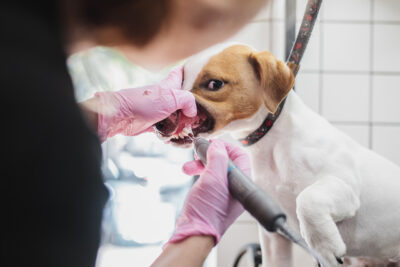
Conclusion: Puppy Dental Care
Recap of Key Points
- Importance of Dental Care: Dental care is crucial for puppies to maintain their overall health and well-being. Just like humans, puppies can suffer from dental issues such as tartar buildup, gum disease, and tooth decay if their teeth are not properly cared for.
- Common Dental Issues: Common dental issues in puppies include tartar buildup, retained baby teeth, and fractured or broken teeth. It’s important to monitor your puppy’s dental health and seek veterinary care if you notice any signs of dental issues.
- Establishing a Dental Care Routine: Establishing a dental care routine for your puppy is crucial for their oral health. Daily brushing, choosing the right toothbrush and toothpaste, and using other dental care products such as dental chews and mouthwash can help maintain your puppy’s oral health.
- Preventative Dental Care Measures: Proper diet, providing chew toys, and avoiding dental hazards are important preventative measures for your puppy’s dental health. Regular veterinary check-ups and dental cleanings are also essential components of preventative dental care.
- Training Your Puppy for Dental Care: Using positive reinforcement techniques can help train your puppy for dental care, making the process enjoyable for both of you. Introduce your puppy to toothbrushing gradually and reward good behavior to make the experience positive.
- Breed-Specific Dental Care Considerations: Dental care for small and large breed puppies requires special attention due to their size and jaw structure. Start a dental care routine early and provide appropriate dental care products for their specific needs.
Importance of Consistent Dental Care for Your Puppy
Consistent dental care is vital for your puppy’s overall health and well-being. Regular dental check-ups and proper oral hygiene can help prevent dental issues such as tartar buildup, gum disease, and tooth decay. By establishing a dental care routine early and maintaining it consistently, you can help ensure that your puppy maintains a healthy and happy smile for years to come.
If you’re looking for puppies for sale in Florida and surrounding areas, visit our website, where our puppies are thoughtfully bred from reputable breeders.
Frequently Asked Questions (FAQs): Puppy Dental Care
- When should I start caring for my puppy’s teeth?
- It’s best to start caring for your puppy’s teeth as soon as possible. You can begin by gently rubbing their gums with your finger to get them used to the sensation. Introduce a toothbrush and toothpaste formulated for dogs when they are around 8-12 weeks old.
- How often should I brush my puppy’s teeth?
- Ideally, you should brush your puppy’s teeth daily to prevent plaque and tartar buildup. However, if daily brushing is not possible, aim for at least 2-3 times a week to maintain their oral health.
- What should I do if my puppy resists tooth brushing?
- If your puppy resists tooth brushing, start by introducing the toothbrush gradually. Use a finger brush or wrap a piece of gauze around your finger to get them used to the sensation. Reward them with treats and praise to make the experience positive.
- Are there any alternatives to tooth brushing for dental care?
- Yes, there are alternatives to tooth brushing for dental care. Dental chews and toys designed to promote dental health can help reduce plaque and tartar buildup. However, these should not replace regular tooth brushing.
- How often should my puppy have a dental check-up?
- Your puppy should have a dental check-up at least once a year as part of their routine veterinary care. However, if you notice any signs of dental issues such as bad breath, drooling, or reluctance to eat, you should take them to the vet for a check-up.
- Can puppies get dental diseases like gum disease and tooth decay?
- Yes, puppies can develop dental diseases like gum disease and tooth decay if their teeth are not properly cared for. Regular dental care, including brushing and dental check-ups, can help prevent these issues.
- Are there any signs that my puppy may have dental problems?
- Yes, there are several signs that your puppy may have dental problems, including bad breath, discolored teeth, excessive drooling, and reluctance to eat. If you notice any of these signs, you should take your puppy to the vet for a dental check-up.
- What should I do if my puppy loses a tooth?
- It is normal for puppies to lose their baby teeth as their adult teeth come in. If your puppy loses a tooth, there is usually no need for concern. However, if you notice any signs of pain or infection, you should take them to the vet for an evaluation.




